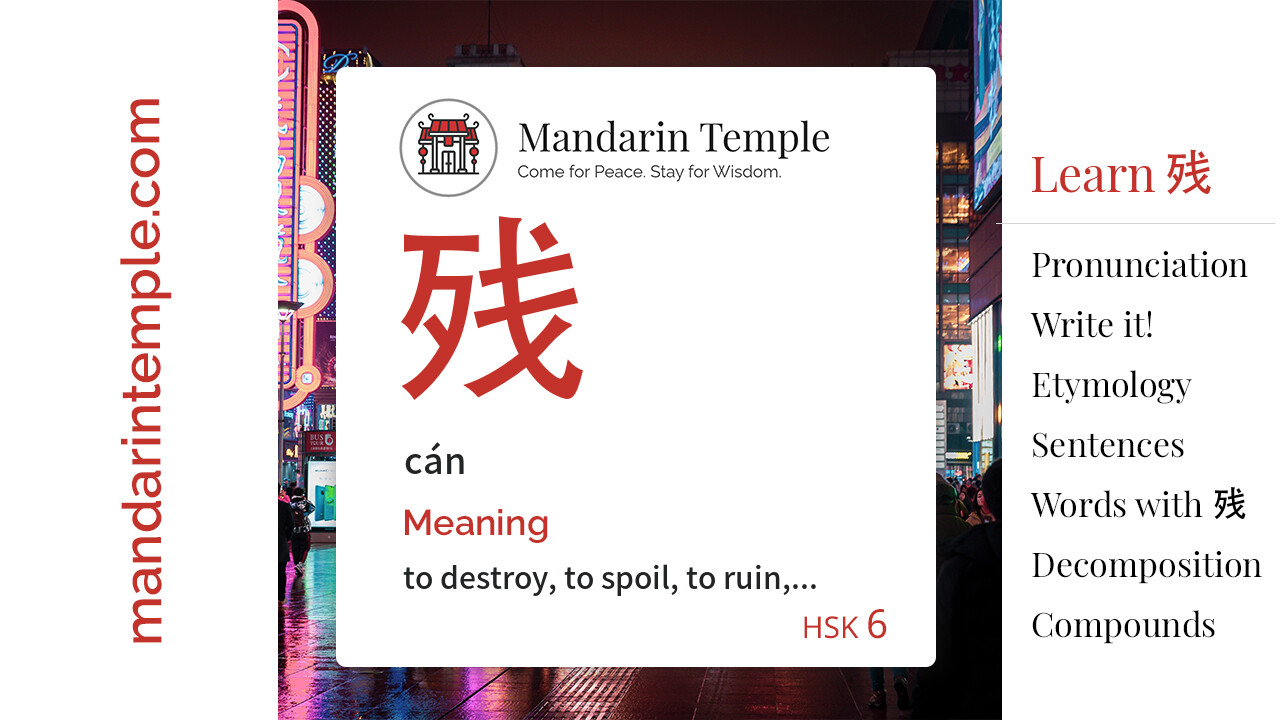Pronunciation
残 cán
To complete this step you need to listen to the audio pronunciation of the word once.
残 cán Meaning
Learn the Pinyin Pronunciation and 14 English Translations of the word 残 cán .
To complete this step you need to read and scroll down.
- Pīnyīn Pronunciation
- cán | can2
- English translation
- to destroy
- to spoil
- to ruin
- to injure
- cruel
- oppressive
- savage
- brutal
- incomplete
- disabled
- to remain
- to survive
- remnant
- surplus
- to injure, to ruin, to spoil; cruel, oppressive, savage; disabled, incomplete
Learn the Chinese word 残 cán in 8 easy steps:
Write it!
Practice your Chinese writing skills and learn precisely where and when to draw every stroke of the
Chinese word 残 cán .
Press the Show Strokes button to see the strokes and their order and hit Start Drawing when you are
ready to practice.
To complete this step you need to write the word once.
Spread the word
“Do the difficult things while they are easy and do the great things while they are small. A journey of a thousand miles must begin with a single step.”
Lao Tzu Tweet
Example sentences using 残 cán
Broaden your vocabulary by interacting with 5 audio-assisted sentences using the Chinese word 残 cán in different contexts.
To complete this step you need to listen to each of the five Chinese sentences at least once. and scroll down.
到 dào 1644年 Nián ,这 zhè 残垣 cán yuán 中 Zhōng 只 zhǐ 剩 shèng 一 yī 堆 duī 石头 shítou .
In 1644, a lone heap of stones from this remained.
你 nǐ 现在 xiànzài 要 yāo 是 shì 失败 shībài 了 le , 谁 shuí 来 lái 收 shōu 拾 shè 残局 cán jú ?
If you fail now, who will pick up the pieces?
数百 shù bǎi 名 míng 无辜 wúgū 平民 píng mín 遭 zāo 残杀 cán shā .
Hundreds of innocent civilians were cruelly slaughtered.
Words with 残 cán
Explore 25 words and sayings that include the Chinese character 残 cán in their composition.
To complete this step you need to read and scroll down.
| Frequency | Simplified | Meaning | Traditional |
|---|---|---|---|
| 残 cán | to destroy | 殘 cán | |
| 残忍 cánrěn | cruel | 殘忍 | |
| 残酷 cánkù | cruel | 殘酷 | |
| 残疾人 cán jí rén | disabled person | 殘疾人 | |
| 残留 cánliú | to remain | 殘留 | |
| 残疾 cánjí | disabled | 殘疾 | |
| 残骸 cán hái | remains | 殘骸 | |
| 凶残 xiōng cán | savage | 兇殘 | |
| 残余 cán yú | remnant | 殘餘 | |
| 残暴 cán bào | brutal | 殘暴 | |
| 残废 cán fèi | deformity | 殘廢 | |
| 残杀 cán shā | to massacre | 殘殺 | |
| 摧残 cuīcán | to ravage | 摧殘 | |
| 残局 cán jú | endgame (in chess) | 殘局 | |
| 伤残 shāng cán | disabled | 傷殘 | |
| 残害 cán hài | to injure | 殘害 | |
| 残留物 cán liú wù | remnant | 殘留物 | |
| 自相残杀 zì xiāng cán shā | to massacre one another (idiom); internecine strife | 自相殘殺 | |
| 残缺 cán quē | badly damaged | 殘缺 | |
| 残存 cán cún | to survive | 殘存 | |
| 残渣 cán zhā | remainder | 殘渣 | |
| 残破 cán pò | broken | 殘破 | |
| 苟延残喘 gǒu yán cán chuǎn | to struggle on whilst at death's door (idiom) | 苟延殘喘 | |
| 残障 cán zhàng | handicapped | 殘障 | |
| 残酷无情 cán kù wú qíng | cruel and unfeeling (idiom) | 殘酷無情 |
AMAZON BOOKSHELF
AMAZON BOOKSHELF
